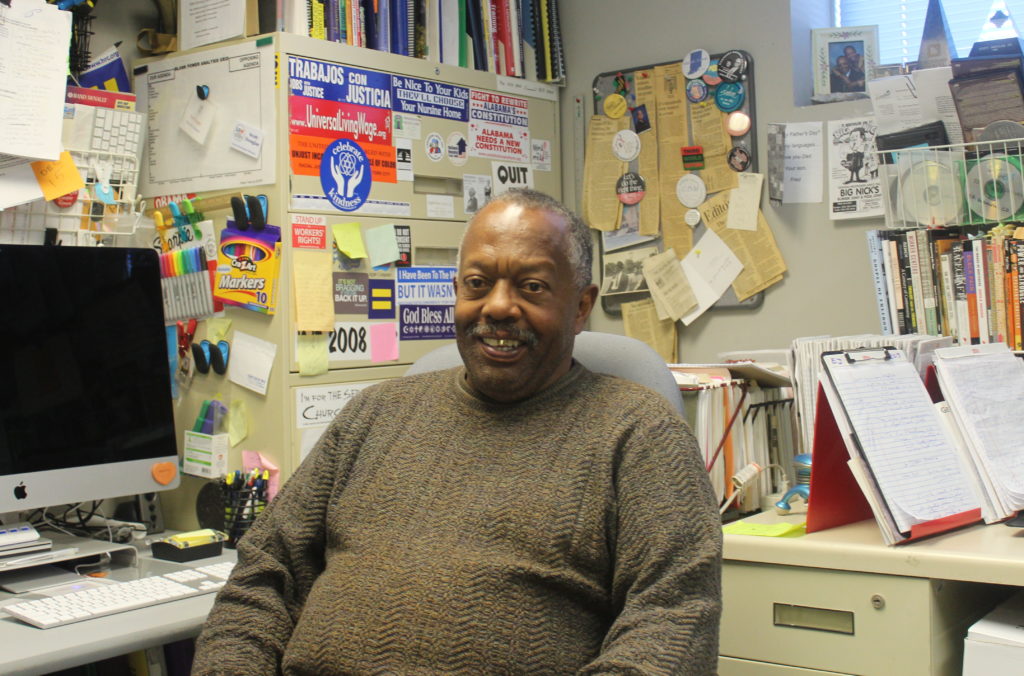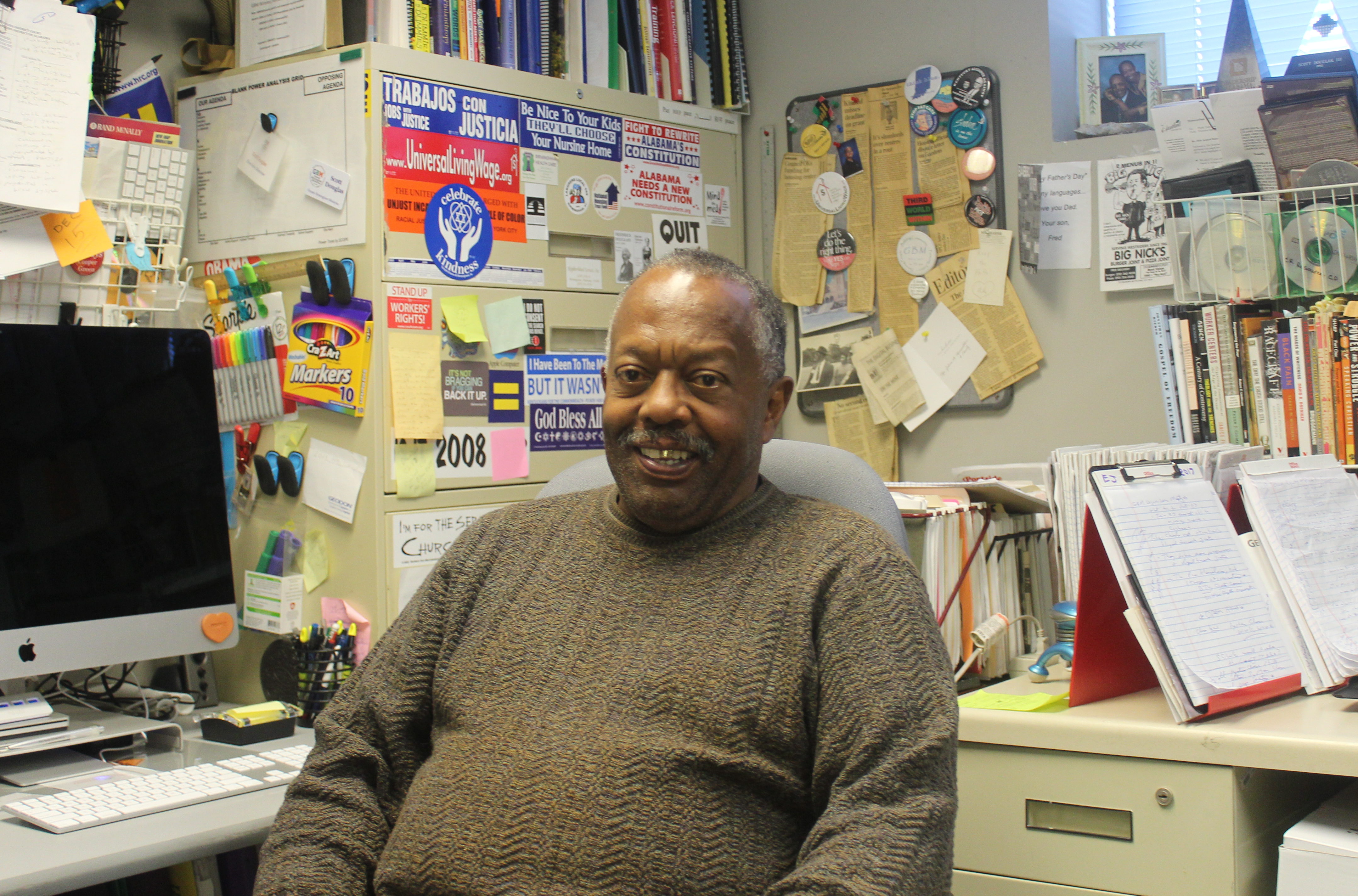By Ariel Worthy
The Birmingham Times

Scott Douglas believes that no one in the world should be hungry.
“Everybody may not be able to eat steak, but everybody should be able to eat healthy foods,” he said.
Douglas is the executive director of Greater Birmingham Ministries (GBM), an organization that assists low-income families “and organizes to address public policies that effect the poor unjustly”—and he knows the importance of GBM firsthand.
Douglas moved from Nashville, Tenn., to the Magic City in 1976, when his wife, Lynn Douglas, got a scholarship to study early childhood education at the University of Alabama at Birmingham. Douglas was unemployed at the time and asked friends where he could get clothes for their then-2-year-old son, Fred.
“They pointed us to the Clothes Closet here at GBM,” he said.
Douglas became GBM’s executive director in 1993, after applying for the position while working as the environmental justice organizer for the Sierra Club Southeast.
“I started as a volunteer [with GBM] back in 1982, when I was working for Fred Shuttlesworth in the Southern Organization Committee for Economic and Social Justice,” Douglas said. “At the time, [GBM] was working on unemployment and trying to reduce utility rates. That’s when I got involved, and by 1984 I became a member of the board.”
Committed to Community Service
Douglas, 70, is a true community servant. In addition to working with GBM, he sits on the boards of several humanitarian organizations, including AIDS Alabama, the Alabama Poverty Project, the Gulf Coast Fund, the Progressive Technology Project, the Equal Justice Initiative of Alabama, and the steering committee of the Alabama Organizing Project.
He credits his family for sparking his commitment to community service.
“I didn’t know it at the time, but when I was growing up we were poor. We were never hungry, though,” Douglas said. “My mom was a maid, and my dad was the sole employee at a feed store. Neighbors would share food, and we would share food. There were often guests at the table.”
Growing up, Douglas said he didn’t have an appreciation for being able to share food with others.
“There was one family that had eight kids, and we would share food with them often,” he remembered.
Victimized
Douglas attended the University of Tennessee, where he cofounded the Black Student Union. He studied engineering and physics, political science, and urban planning. As a black student in the 1960s, Douglas said he grew to not like his school because of many racist encounters.
“During my freshman year, [white students] set fire to my dorm room by pouring lighter fluid under the door and lighting it. Those dorms were airtight, so all the oxygen went out of the room,” Douglas said. “The smoke woke us up, and we managed to get out.”
Another time, Douglas and his roommate were mugged by white students. His roommate pulled a knife on their assailants, and Douglas and his roommate were reported to the dean.
“There was a black grad student who worked in the Dean’s office. He said, ‘Give me the knife.’ We gave him the knife and he gave us a Boy Scout’s knife. He said, ‘Take that with you when you go see the dean on Monday.’ When we went to the dean and pulled out the Boy Scout’s knife, he told us that the boys said it was a switchblade. I said, ‘Dean, they attacked us. It was dark. It was nighttime. It probably looked like a switchblade to them. And if you continue with this, we’re going to have a press conference about the racism at UT.’ ”
The dean expelled the three muggers from school.
Equity, Not Equality
At GBM, Douglas said he wants everyone to have equity in life, not equality.
“Equality can mean everyone gets size 9 shoes,” he said. “Equity means everybody has shoes that fit their feet. Get people what they need.”
Douglas said the creed he follows in his work is from Micah 6:8 in the Bible: “God says, ‘What’s required of you but to do justice, love mercy, and walk humbly with God.’ That’s three things: be merciful, be just, and be humble.”
One of the priorities for GBM is public transportation for the poor. Douglas believes a lack of public transportation can create a lack of access to recreation, education, and employment.
“You shouldn’t have to have a car to access the amenities and necessities of life, like housing, education, health care, the arts—the bread and roses of life,” he said.
Many jobs are limited to people because of having no way of getting to work.
“If you qualify to be assistant manager or manager in the suburbs, you get higher pay, but you can’t get there,” Douglas said. “We’re working on building up the public through public transportation. We’re not attacking the [Birmingham-Jefferson County Transit Authority]. It’s about building public support for a better transit authority.”
GBM also is also working on the Ban the Box Movement, which is designed to eliminate the question related to felonies and convictions on job applications.
“Why should you keep being punished for something you’re trying to move on from?” Douglas said. “We’re not saying not to do background checks. We’re saying put that off until after the interview if you’re interested in the person. Get to know something about the person. Don’t judge them before you know them.”
Something in Common
Founded 47 years ago, GBM started out as a Christian organization, but it now encompasses Christians, Jews, and Muslims.
Douglas acknowledged there was criticism about allowing other faiths to become a part of the organization.
“Some people said, ‘GBM is a Christian organization, and you’re trying to make us religious soup,’ blending everything together,” Douglas said. “I said, ‘No, we’ll be religious salad. If you’re lettuce, you’re still lettuce. If you’re carrots, you’re still carrots. The dressing that holds us together is what we have in common.’ All three of these faiths, as well as many others, have this in common: love God and love your neighbor as yourself. So we’re going to exist and thrive on what we agree about, not what we disagree about.”





